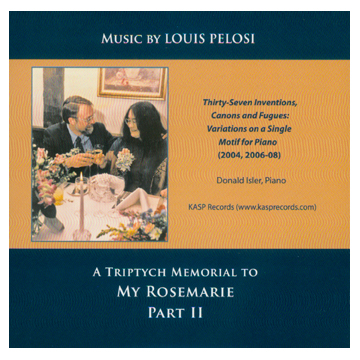|
|
KASP 57702— Music by Louis Pelosi, Part II $ 12 plus shipping (CD) Click here to BUY from the KASP website The composer writes of this new work, which appears here in its first recording "Inventions, Canons and Fugues: Thirty-Seven Variations on a Single Motif is the sequel to my Thirteen Preludes and Fugues (2000-2003) and is its completion as far as contrapuntal emphasis, unmixed by other considerations, is concerned.....Each form wends its way through the twelve tones of the scale, as well as possible mirroring the structure of the motif itself." Indeed, this work is an extraordinary example of a contemporary composer using old forms in his own unique, and very expressive idiom. This disk is Part II of a three part series of recordings of music by Louis Pelosi dedicated to the memory of his wife, Rosemarie Koczÿ, the noted artist, who devoted much of her work to her memories of the Holocaust. Pianist Donald Isler has been praised in the New York Times, and elsewhere for his performances of contemporary and classical repertoire. "...Music full of pulse and ingenuity.....The ideas are unfolded logically and with a keen ear for sonority" wrote Alan Blyth of the London Daily Telegraph in reviewing the premiere of Louis Pelosi's Seven In(ter)ventions For Piano at Wigmore Hall. The American Record Guide said of this disk: "There is something about Pelosi's work that is Bachian in its balance between poise and intensity ... The interesting thing is that Pelosi is so imbued with Bach's spirit that he has written all of these pieces (the Inventions, Canons and Fugues for Piano) with an enthusiasm that makes them acceptable to the listener. I listened to them all and was never bored. Pelosi has a real gift for holding the listener's interest. Isler plays them with taste and affection." And Fanfare Magazine wrote: "The pianist Donald Isler gives his own brief listening guide in the booklet, including pointing out the "Rosemarie" theme (No. 29) and the way that the finale ("Double Canon at the Octave and Fughetta in C, G, F and C") acts as a "suite" in itself before "tapering off into a beautiful, almost mystical end." Along the way comes a variety of fugues, from the massively angular Fugue in F# to the solemn yet contemplative Fugue in E (a piece which puts me in mind of late Beethoven) and the playful but bittersweet Fugue in A and beyond. The finale, which itself comprises part 5 in its entirety, oozes breadth. It is difficult to imagine a more committed, or capable interpreter than Donald Isler (who, it turns out, is founder of KASP Records.)" MusicWeb International said: Part II is devoted to the Thirty-Seven Inventions, Canons and Fugues on a Single Motif for solo piano, played by Donald Isler. They are a sequel to the Thirteen Preludes and Fugues, with Epilogue (which I reviewed last year) in a performance on the piano Mateusz Borowiak, also for KASP records. The thirty-seven pieces are divided up into five sections. Four sections consist of nine parts each, the fifth is a finale. In the general layout, the inventions gravitate towards the beginning of the cycle, with the fugues to the latter part. The canons appear at intervals, each representing the twelve tones of the scale. One senses a gathering of momentum as the cycle progresses, in terms of formal complexity. The cycle rewards the listener with variety and scope. Isler's notes offer suggestions and points of reference to steer the listener through this complex music. Here are some of my thoughts on the individual pieces. No. 4 is dark and melancholic, No. 10 has a reflective stillness (I love Isler's voicing of chords in this one). No. 20 conveys a sense of mystery, and No. 6 emits a glistening, diaphanous glow. No. 8 is spiky and restless, as is No. 22. No 27 progresses with a hesitant stride.KASP 57702: Inventions, Canons and Fugues: Thirty-Seven Variations on a Single Motif |
